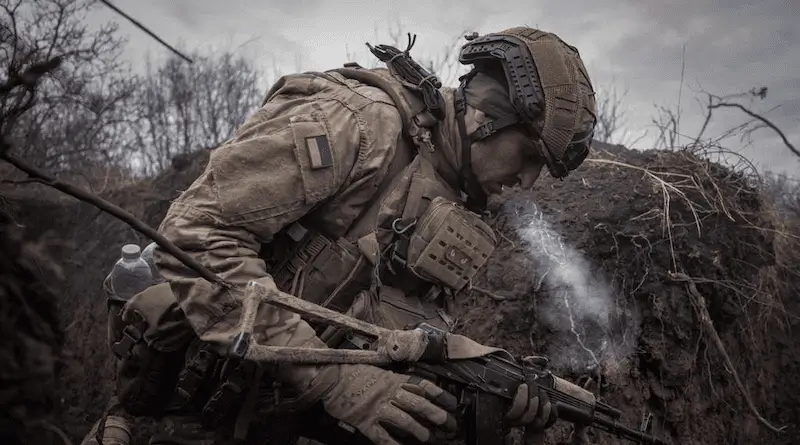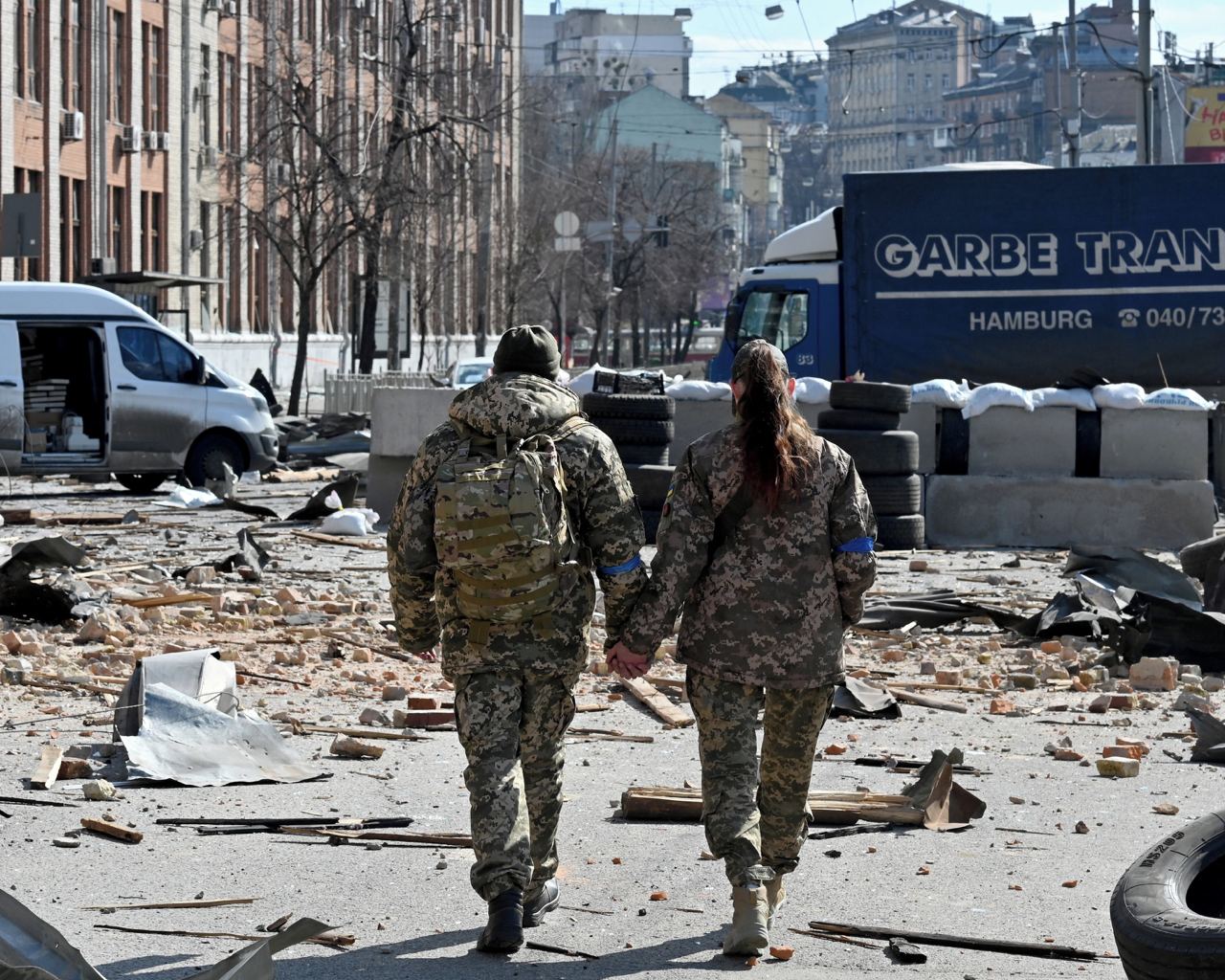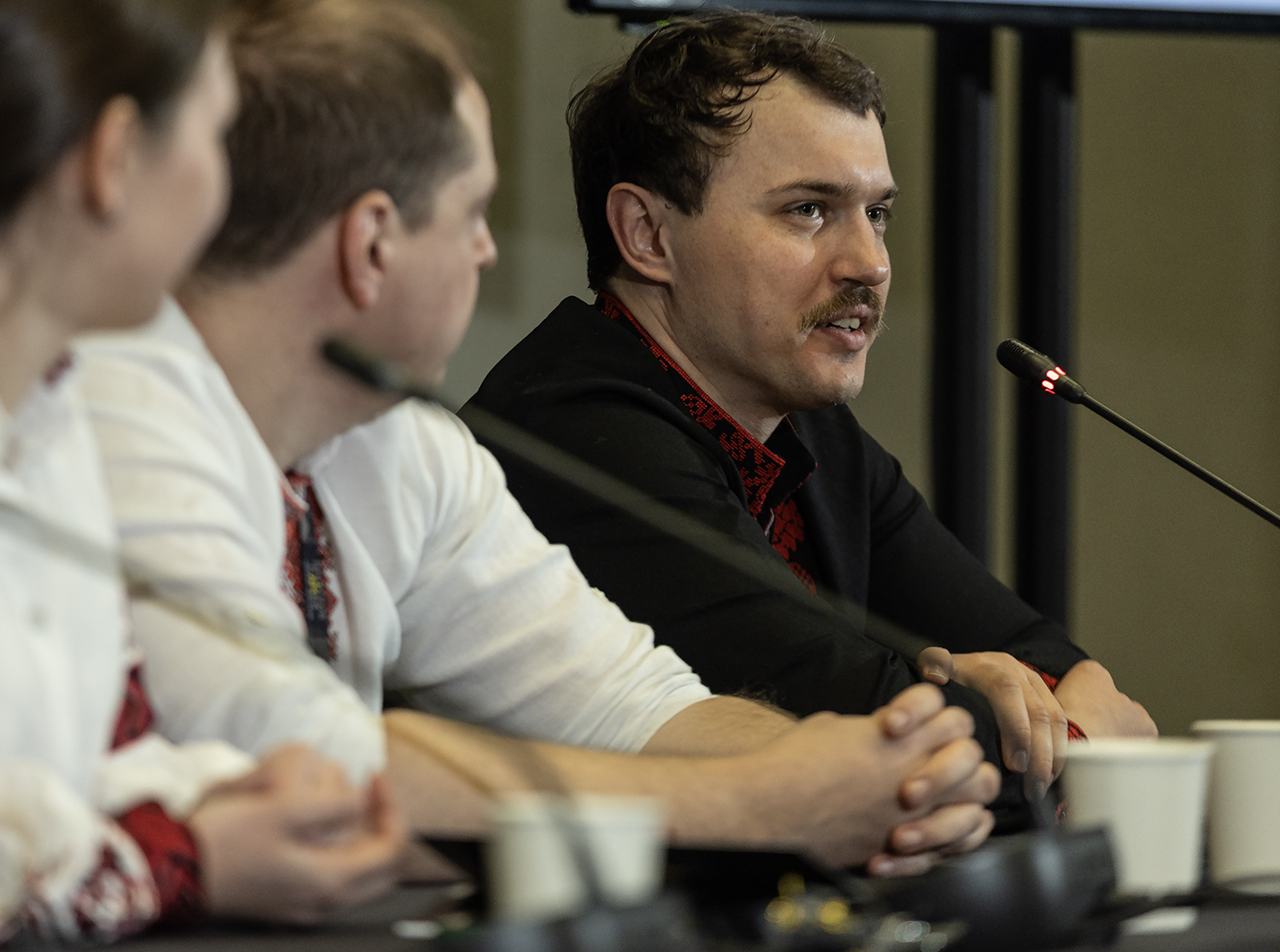
Ukrainian chemist Artur Mylin lost his right leg above the knee in an October 2022 Russian rocket attack. He competed at the 2025 Invictus Games in Vancouver-Whistler. [Stephen J. Thorne/Legion Magazine]
Mylin, with a PhD in chemical sciences, two lucrative grants and a president’s scholarship under his belt, had been planning to move to Canada, home to the world’s third-largest population of Ukrainian heritage.
“I wanted to move not because I don’t love my country, but to see the world and gain some experience,” he said. “I wanted to live life as interestingly as possible. That was the goal. I improved my English and prepared documents.”
It was not to be, however. Instead of leaving his homeland, he went into his labs at the institute, turned off the lights, sealed the rooms, and joined his friends on a determined trek to one of Kyiv’s military commissariats. He enlisted with the 131st Battalion, 112th Independent Brigade of Ukraine’s Territorial Defence Forces.
“Like many other fellow Ukrainians, I felt it was my duty to defend my country,” he told a news conference at the 2025 Invictus Games in Vancouver, where he was competing.
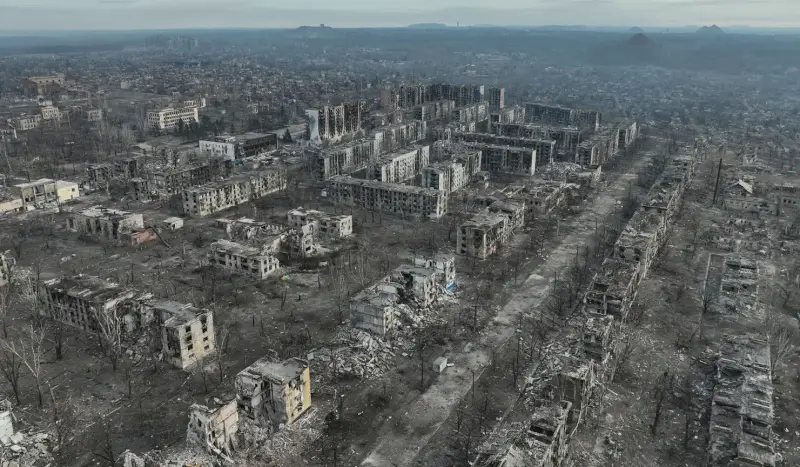
Residential and administrative buildings damaged and destroyed by continued Russian military strikes in Toretsk, Donetsk Region, Ukraine, on Dec. 19, 2024.
[Сonsolidated Brigade “Khyzhak” of the Ukrainian Patrol Police Department]
Mylin’s unit was subsequently deployed to the eastern front, a significant proportion of it Russian-speaking and highly urbanized. It stretches from the Central Russian Upland south to the shores of the Sea of Azov. Names such as Kharkiv, Dnipro, Mariupol and Donetsk have come to symbolize Ukraine’s extraordinary defence.
Mylin and his comrades were attached to various brigades, fighting brutal battles near Komyshuvakha, conducting operations in Kramatorsk, and holding the village of Terny in the Donetsk region.
“The place was heavily shelled,” he told the Rubryka newspaper in October 2023. “Once, a Grad (Russian rocket) flew into our yard, but the shell exploded on the roof of the house and, if it had flown into it, 17-20 people would have died.
“In fact, it was more surprising not to die during those seven months than the other way around. There were…missions when we lost 20 people in a day.”
“I managed to die there—it was a clinical death.”
“In this war, everything matters,” he told the Invictus news conference. “The battles are very intense, and many soldiers do not survive their first fight.”
In fact, Mylin did die. He was hit in October 2022, his ninth month at the front. He remembers the explosion. He said he was lucky because a lull in the fighting allowed his fellow soldiers time to stabilize and evacuate him.
“I managed to die there—it was a clinical death. Everyone did a really good job; thanks to that, I didn’t die. I was unlucky that I was [wounded], but lucky to survive.”
Allied support has been critical to the defence of Ukraine. Even the small things: Mylin said a new kind of tourniquet provided by an allied nation is what saved his life, preventing him from bleeding out. He lost his right leg above the knee.
He was taken to a hospital in Dnipro, where his mother happened to be working as a cleaner. “That’s why I knew everything would be fine,” he told Rubryka.
He underwent multiple operations before he was transferred to a Lviv hospital, and more operations, then on to a rehabilitation centre in Halychyna and, ultimately, a clinic in Estonia, where he taught himself computer code while he was being fitted with a prosthesis, a long process of adaptation and conditioning.
“Thoughts that it will be super easy may have been superfluous,” he admitted. “But in general, I begin to feel that the leg is functional. I am very grateful for the leg. It is simply chic!”
He rented an apartment and made new friends in Tallinn, contacted Ukrainian emigrants and diplomats, took walks around the city, and met a psychologist. His knowledge of English helped.
He and the psychologist still communicate; he shares videos of how he does things; she shares them with doctors and therapists.
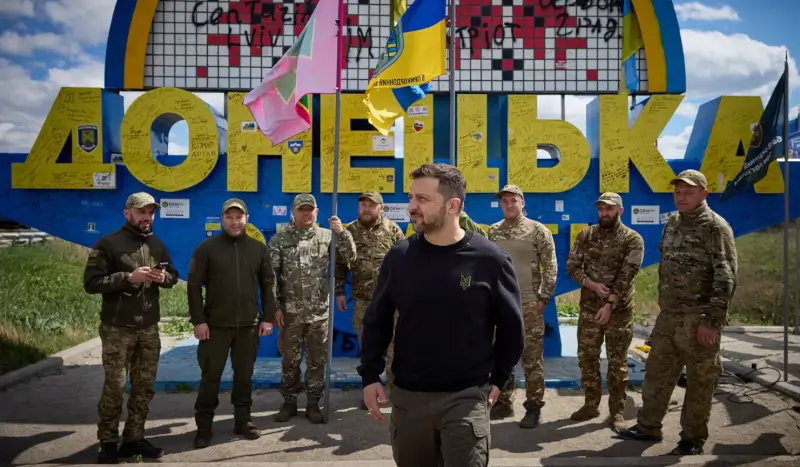
Ukraine President Volodymyr Zelenskyy appears with Ukrainian servicemen in front of a road sign in Donetsk Region, Ukraine, on April 19, 2024. [Ukrainian Presidential Press Service]
“They emptied all their warehouses of weapons to help us.”
“It is war today or something else later.”
After returning to Ukraine, Mylin contacted his institute. But his research team were all still fighting. He couldn’t sleep, knowing that they were at the front while he was at home.
Before the war, he was working in continuous-flow analysis, a relatively new and developing process that simplifies, accelerates, integrates, scales-up and automatizes chemical reactions. It’s inherently safer and greener than traditional batch processes.
Now he’s learning how to “create explosions.”
“We try to do this work in our institute,” he said in Vancouver. “We don’t have enough knowledge about this, but we are learning and have had some success.
“I hope we also will create some productive manufacturing in Ukraine or in the nearby countries which will be safe and create our own weapons.”
Mylin said Ukraine has had “a lot of enemies over the centuries.”
“It is not unusual for humanity to fight and have wars,” he said. War with Russia is not new, he added. “It is war today or something else later.”
“We should continue to fight because our back is strong and there are a lot of people who will care about us.”
Most recently, confrontation with Russia has simmered and boiled since the Orange Revolution in 2004, an escalating series of protests in the aftermath of a Ukrainian presidential election marred by massive corruption, voter intimidation and electoral fraud. The results were annulled and a re-vote ordered by the country’s supreme court.Viktor Yushchenko subsequently defeated Moscow-leaning Viktor Yanukovych. Yanukovych then won in 2010. He has since gone into exile in Russia.
In February 2014, Russia occupied and annexed the southern peninsula of Ukraine, Crimea, and began supporting pro-Russian separatists fighting their country’s military in the Donbas region. Russia covertly supported the separatists with its own troops, tanks and artillery, preventing Ukraine from fully retaking the territory.
With Ukraine poised to join the NATO alliance, Putin announced a “special military operation” to “demilitarize and denazify” Ukraine in February 2022, claiming Russia had no plans to occupy the country.
Russia’s invasion was internationally condemned (by 145 countries formally at the United Nations); 45 imposed sanctions against Russia, and many sent humanitarian and military aid to Ukraine.
But we gave it to them and it didn’t stop them. They don’t want land; they want us as slaves.
“I was in Russia a few times,” said Mylin. “I have had friends there—almost relatives, like family. [Russians] are totally sure that they are smarter than we, that we should be like their servants, even in the 21st century.
“And sometimes some of our people have been influenced by this, by [Russian propaganda], like TV, and they also begin to think that ‘oh, probably they are really stronger; we should be afraid of them; if they invade, we will lose.’
“But, honestly, we are the same—the same muscles, bones, and they can die if we shoot them. They’re nothing special. And, so, we do what we should do because this is really rude. It’s not about land. It’s not about land, this fight.
“In my point of view, we gave them the Crimean without any bloodshed. For some reason, we looked like fools, we should fight. But we gave it to them, and it didn’t stop them. They don’t want land; they want us as slaves. It’s normal for them, such behaviour. So that’s why we protect ourselves, our families, and genders.”
A report by the Washington, D.C.-based Institute for the Study of War says Moscow has “paid an exorbitant price in manpower and equipment losses that Russia cannot sustain in the medium term for very limited gains.”
“Russian losses in massive efforts that have failed to break Ukrainian lines or even drive them back very far are exacerbating challenges that Russia will face in sustaining the war effort through 2025 and 2026,” says the Feb. 25, 2025, report, entitled “Russia Has Failed to Break Ukraine.”
“Ukraine, on the other hand, has shown its ability to fight off massive and determined Russian offensive efforts even during periods of restricted Western aid.”
It says Ukraine could inflict more serious battlefield defeats on Russia and compel Putin to rethink his approach to the war and to negotiations “if the United States and the West continue to provide essential support.”
American support for Ukraine has been off-again, on-again since U.S. President Donald Trump’s infamous attempt to humiliate Ukrainian President Volodymyr Zelenskyy at the White House on Feb. 28. European allies have since pledged to step up military support to the embattled country.
A former power lifter, Mylin competed in swimming, wheelchair basketball and rugby, seated volleyball, skeleton and biathlon at the Games in Vancouver-Whistler.
Advertisement









